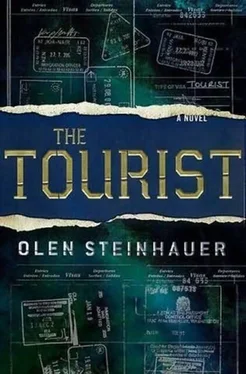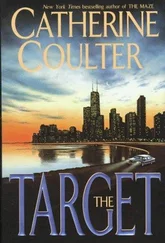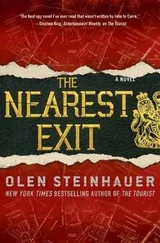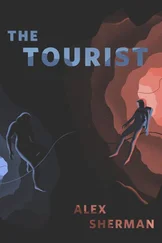The blood rushed to Milo 's head, mixing with the beers and his overall lack of food. "I don't know much. All I know is those agents are after me for something I didn't do."
"For Angela's murder," she said.
"Let me talk to Daddy!" said Stephanie.
Now he knew-Simmons believed he had killed Angela. "I have to figure this out."
Again, silence, punctuated only by Stephanie's plea: "I want to talk to Daddy!"
Explain, she'd said, so he tried: "Listen, Tina. Whatever those people from Homeland said, it's not true. I didn't kill Angela. I didn't kill anyone. But I just don't know enough to say more than that."
"I see." Her voice was flat. "Special Agent Janet Simmons seemed to think she was pretty justified in her suspicions."
"I'm sure she thinks so. But whatever she's calling evidence… I don't even know what it is. Did she tell you?"
"No."
He wished she knew something. "The only thing I can think of is someone's setting me up."
"But why}" she insisted. "Why on earth-"
"I don't know," he repeated. "If I knew why, I would know who. If I knew who, I could figure out why. You follow me? And in the meantime, Homeland Security thinks I'm either a killer or, I don't know, a traitor."
Again, silence.
He tried again: "I don't know what that woman's been telling you, but I've got nothing to be ashamed of.”
“And how are you going to prove that?"
He wanted to ask if the proof was for them or for her. "Are you going to Austin?"
"Tomorrow, probably. But where are you?”
“Good. I'll be in touch. I love-”
“Daddy?"
He jerked physically; she'd handed over the phone without telling him. "Hey, Little Miss. How are you?”
“I'm tired. Your friends woke me up.”
“Sorry about that. They're jerks, aren't they?”
“When're you coming back?”
“As soon as my work's done."
"Okay," she said, again sounding so much like her mother that Milo 's stomach started to cramp. When they finished, Stephanie claimed not to know where her mother was, so they hung up.
Milo stared across the rows of chairs at families, some excited and others bored by their prospective trips. A fresh cramp hit him. He got up, stiff, and half-jogged down the carpeted terminal, past electric walkways, until he reached the bathroom. He shut himself into a stall and was sick, getting rid of all the beer his body hadn't yet absorbed.
He wiped his mouth, gargled water, and returned to the corridor. The sickness had gotten rid of a mental block he hadn't even known was there, fogging up his vision of what to do next. He didn't want to use the Dutchman's phone card after boarding the plane-calling Tina had compromised it-so he put it to use now, dialing + 33 1 12. A female operator informed him in French that he had reached France Telecom directory assistance. He asked for the number for a Diane Morel in Paris. There was only one listing, and he asked her to put him through. It was five in the morning there, so the old woman who answered sounded vaguely terrified. Yes, she was Diane Morel, but she sounded at least sixty. He hung up.
It was a wash, but at least he knew he couldn't simply call up Diane Morel and have a leisurely conversation about Angela Yates and Colonel Yi Lien. If he called the DGSE and asked to be passed on to her desk, or her home, his location would be tracked in minutes and relayed to the Company, and their conversation would be rushed. Milo needed time with Mme. Morel. He popped the battery out of his phone and tossed the SIM card in a wastebasket.
Eight hours later, at one on Friday afternoon, a stolid, graying German behind Plexiglas compared his passport photo to the well-attired but exhausted-looking businessman in front of him. "Mr. Lionel Dolan?"
"Yes?" said Milo, smiling broadly. "Are you here for business?”
“Happily, no. Tourism."
Just saying it again brought back unwanted memories. Milo remembered all those other airports, border guards, customs officials, and carry-on bags. He remembered plainclothes policemen and agents clutching newspapers and the times when he, too, held those newspapers, sitting for hours in airports, waiting for contacts who sometimes didn't arrive. Frankfurt Airport, one of Europe 's great, ugly hubs, had hosted him many times.
The border guard was holding out his passport, so he took it. "Have a good vacation," the man told him.
Steady, but not hurried. He carried his knapsack past the customs officials, who-like most of Europe 's customs officials-weren't going to bother a man in a tie. He continued through the crowded baggage claim, heading directly out to the noisy, car-choked curb, where he smoked a Davidoff. It didn't taste as good as it should have after the long flight, but he finished it anyway as he walked to a pay phone near the taxi stand. He dialed the number he'd memorized somewhere over the Atlantic.
It rang three times. "Ja?"
"The last camel," said Milo.
A pause, then: "Collapsed at noon?"
"It's me, James."
" Milo?"
"Can we meet?"
Einner didn't sound overjoyed by the call. "Well, I am in the middle of something.”
“Right now?"
"Uh, yeah," he said, then Milo 's throat closed up as he heard a muffled voice in the background trying to scream. He knew that sound. The noise of someone who'd been gagged.
"When'll you be free?"
"Give me… I don't know. Forty minutes?"
"Where?"
"I'm in the Deutsche Bank right now, so-"
"The twin towers?"
"Yeah."
Milo imagined him in an office in one of the upper floors of those famous mirrored towers in the center of the financial district, some unfortunate CEO bound and gagged under his desk, while Einner casually made a date on the phone. He'd forgotten how rough Tourism could be.
"Listen, you know the Frankfurt Opera? Let's meet in front of there around two. I'll have another chance to prove we're not uncultured hacks."
"Should you be saying all that aloud, James?"
Einner grunted. "This guy? In ten minutes, he won't be able to say a thing."
The man's muted howls rose in pitch.
He took a clean, sparse train to Frankfurt Hauptbahnhof, where he hooked his knapsack over his shoulder and went on foot past afternoon gridlock toward the Friedensbrucke. Instead of crossing the bridge, he turned left up the dock running alongside the Main River. All the well-dressed businessmen and teenagers and pensioners reminded him of Paris. Only a week ago.
He grabbed a schnitzel sandwich from a street vendor and walked back inland to the long park at Willy-Brandt-Platz, where he took a bench and gazed at the glassy modern face of the Oper Frankfurt. Despite Einner's confidence that he could speak openly in front of his captive, Milo kept an eye on passersby. It was" a habit he'd lost in the last six years, a habit he needed to regain if he wanted to stay a free man.
All Tourists know the importance of awareness. When you enter a room or a park, you chart the escapes immediately. You take in the potential weapons around you-a chair, ballpoint pen, letter opener, or even the loose, low-hanging branch on the tree behind Milo 's bench. At the same time, you consider the faces. Are they aware of you? Or are they feigning a forced ignorance that is the hallmark of other Tourists? Because Tourists are seldom proactive; the best ones bring you to them.
Here in the sunny park, he noticed a woman at the curb having trouble starting her car. That was a typical setup. Feign exasperation until the target makes his own decision to come and help. Then you have him.
Two children-twelve or so-played along the base of a huge, lit-up euro sign that dominated the park. Another potential trap, because Tourists are not above using children for their ends. One child falls and pretends injury; you go to help; a "parent" approaches. Simple.
Читать дальше
Конец ознакомительного отрывка
Купить книгу












